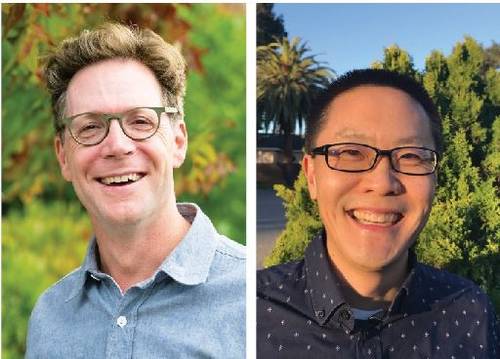March Clergy / President's Column by President Andy Cheng
 Meitzarim: Freeing Ourselves from the Narrow Places
Meitzarim: Freeing Ourselves from the Narrow Places
There is a well-known pun found in Chasidic texts: Mitzrayim, Egypt, is associated with the word, meitzarim, meaning straits, or narrow places. At our seders, we celebrate being liberated from constraints, we sing of escaping from the narrow places, and we pledge ourselves to working towards the liberation of all who are oppressed.
This has been a year in which we all have lived in the narrow places, and the conception of Egypt as meitzarim will have particular resonance during this year’s rituals of Pesach. By Saturday evening, March 27, the first night of Passover, we will have been sheltering in place for over a year. It has often been observed that creativity is a response to limitations. Despite the many constraints that we have experienced, this has also been a year of great creativity for Beth Am: together, we have discovered new ways to build Jewish community — to liberate ourselves from the present circumstances that prevent us from gathering in-person — and we intend to continue to utilize these innovations when we are able to resume in-person activities.
Certainly, Zoom has served as a well-spring for new approaches to connecting us as a community. For many of us, it was at our seders last year, when we experienced for the first time how Zoom could function as a tool that liberates our ritual practices. The Haggadah states, “Let all who are hungry come and eat,” an invitation to all who are hungry that they should join us to dine at our seder tables. The same statement has been interpreted as an orientation to welcoming guests to our seders, inviting anyone who is curious about Passover rituals to join us in this remarkable custom of home-based learning through ritual.
Through Zoom, our seder tables are ever expandable and able to accommodate many newcomers. Andy recalls that last year he and Abi hosted an online seder that enabled folks from the Chinese side of their family to join from multiple parts of the country — and from different time zones — an experience which had never before been possible. Rabbi Morrison’s seder table in Berkeley had virtual seats for friends and family members living in Boston, Maine and Virginia. Relatedly, throughout the pandemic the clergy have made a practice, at the beginning of any lifecycle event that they are leading on Zoom, to invite participants to type into the chat where they live. The locations span the globe. We’ve celebrated B’nei Mitzvah, and mourned for our dead, with households in Abu Dhabi, Israel, Singapore, Sydney, Argentina, Hong Kong, Amsterdam, Costa Rica — to name only a few of the foreign locales — and from pretty much every state in the country. While we continue to live in meitzarim, this small innovation gives us a momentary feeling of openness, a fuller sense of the breadth of our Jewish community, and demonstrates how our rituals, when conducted online, provide a meaningful way to strengthen our relationships, bridge geographic distances, and are able to create feelings of warmth and intimacy between us.
Perhaps too, our sense of living in constraints during this past year has contributed to our prioritization of the evolution of our community to become even more welcoming, ever more open, to Jews of all backgrounds, so that Beth Am reflects and incorporates the ever-growing diversity of the Reform Jewish community, particularly within the Bay Area. The seder is our unparalleled, yearly ritual for transmission of our most important stories and values to younger generations. In order for synagogue-based Judaism to remain relevant in the 21st century, the next generation needs to see that Beth Am is embracing the full diversity of our people and is engaged with issues that are important to their identity and their values.
Ideally, our seders are intergenerational moments of encounter, festive opportunities to re-vision our world, or envision a world as it should be. To “set the table,” and to emphasize the value of welcoming newcomers into our community, Andy’s family uses a one-page, supplementary reading called Welcoming All: An Inclusive Passover Reading, created by Bechol Lashon, which includes these words of call and response:
Leader: We welcome Jews of all ethnic background to join us at our table;
All: There are many ways to express and celebrate Jewish traditions.
Leader: We welcome Jews of all races to join us at our table;
All: We learn and grow from many points of view.
Leader: We welcome all those exploring or connected to Judaism to join us at our table;
All: A variety of experiences and understandings strengthen the Jewish people.
All: We welcome all who have ever felt like strangers to our table. Tonight we go forth together for we were all strangers in Egypt.
While we continue to experience living in meitzarim, through the prayers, texts and songs of the Hagaddah, we voice our aspirations and rededicate ourselves to the construction of a society of truth, peace and compassion. We encourage you, particularly this year, to find opportunities to include newcomers at your seder table (even if virtually), and we wish you a joyful Pesach.
L'shalom,


Rabbi Jeremy S. Morrison Andy Cheng, Beth Am President


 We strive to live as a holy community whose study and practice of Judaism inspires and challenges us to "do justice, to love kindness and to walk humbly with our God" (Micah 6:8).
We strive to live as a holy community whose study and practice of Judaism inspires and challenges us to "do justice, to love kindness and to walk humbly with our God" (Micah 6:8).